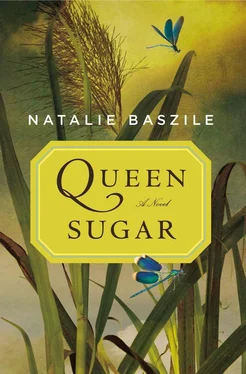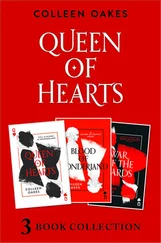“Can I bring my treasure?”
“Sure. And grab Zach. I know he won’t want to miss this.”
• • •
It took Ralph Angel a while to find the ruins of the old sugar mill just outside town. When he was a boy, cane fields covered the acres, but since then they’d been subdivided, the cane cleared, and now, sprawling ranch-style homes dotted that stretch of the snaking bayou. But he found the spot eventually, and led Blue through a narrow stand of cherry trees and water oaks, cypress, wax myrtles, pecans and hackberries, until he found the barge slip, an inlet cut deep into the bank, where all through the 1800s, workers loaded barrels of molasses onto barges headed to New Orleans. Ralph Angel set down his tackle box. Across the bayou, the woods of Camperdown Plantation, just as dark and menacing as he remembered, inched right up to the bank, nudged the saw grass and elephant ears and water lilies deeper into the murky water. He was glad remnants of the old wooden Civil War bridge were still there, and as he baited the hooks, Ralph Angel tried to recall the details of the Battle of Irish Bend he’d learned in school; how Union troops had crossed over that bridge as they pursued General Taylor’s rebels; how in just over a day, three hundred fifty Union soldiers were killed and buried in a trench somewhere nearby.
“Now watch me.” Ralph Angel held the rod over his shoulder then whipped it forward and the line sailed out over the water. The red bobber made a small splash and sent a chain of ripples through the water hyacinths. “Like that,” he said, and reeled in the line. “Now you try.” He handed a pole to Blue.
• • •
Sitting on an overturned bucket, watching clumps of water hyacinths drift down the bayou, Ralph Angel had to acknowledge that he’d forgotten how good it felt to be outside. He liked the way the sun shone on the water and made everything look soft and sort of hazy, the way the water looked like it was sliding by in one long piece, like the whole bayou was on a conveyor belt. An egret landed on the old bridge and stood for a few seconds, perfectly still, looking for fish, before it launched itself back into the air.
From his seat on the tackle box, Blue looked up and said, “Did you come here when you were a little kid?” He took Zach out of his pocket and laid him in the dirt.
“All the time,” Ralph Angel said. “Me and Hollywood. We were best friends.” In his mind’s eye, he saw the two of them as boys standing on the bank. The vision came to him as though through a telescope, their distant silhouettes hazy and dark. Still, it was enough to inspire a pang of longing for his old friend. Ralph Angel looked out over the water. Down the bank, a frog hurled itself into of the shallows.
“I’m hungry,” Blue said.
“I figured that was coming,” Ralph Angel said. He’d packed sandwiches — peanut butter on both sides, just the way Blue liked it, and salami for himself — and while they ate, they watched an alligator, a juvenile, Ralph Angel guessed, judging from the size of its head, drift toward Blue’s bobber.
“Watch this,” Ralph Angel said. He grabbed Blue’s pole and reeled in the line fast as he could. The alligator gave chase, cutting through the water with alarming speed, its mouth open slightly, its snub nose almost touching the bobber until it was a few feet from them and Ralph Angel lifted the line out of the water.
“Pop!” Blue yelled. He fell backward off the tackle box and scrambled toward the woods.
Ralph Angel laughed. “Come back. Don’t be scared. Long as you’re up here and he’s down there in the water, you’re safe.” He looked for the alligator and saw that it had dipped under the surface, and when Blue finally came back to stand at his side, still whimpering a little, Ralph Angel pulled his son next to him. “Pretty cool, huh? I used to do that all the time when I was a kid.”
• • •
Way down in the curve of the bayou, a barge slowly approached. It sat low in the water and Ralph Angel guessed it was filled with sugar from Saint Mary’s Co-op, heading to one of the refineries in Grammercy or Arabi where they turned raw sugar into white.
“Zach and I don’t want to fish anymore,” Blue said. “It’s boring.”
“Okay,” Ralph Angel said. “Bring your pole over here, then y’all can go play.” They should probably head back, but he wasn’t ready to leave; not yet. Not when the air was so warm and the sky was all blue like that. Even the heat wasn’t so bad. No, he wasn’t ready to go.
When Ralph Angel looked up, he saw that the barge was still a ways down the bayou, but moving at a steady clip. He felt the vibration from its engine, like an approaching train, under his feet. He looked around for Blue and saw him standing at the head of the barge slip. He seemed to be talking to Zach as he held him over the water.
Amazing how quickly the barge moved. It was closer now. The engine rumble sent larger ripples, and across the water, Ralph Angel could see the captain high up in the towboat’s wheelhouse, his small white face like a speck of white sugar behind the big glass window. As it approached, the barge sucked water into its enormous hull so that the current up where Ralph Angel sat seemed to flow in reverse and the water level actually dropped. Water hyacinths and lilies clumped together in the backwards flow and even up ahead, in the barge slip, the water seemed to be draining away. Blue still peered into the water. He leaned down, seemed to be looking at something.
“Not too close,” Ralph Angel yelled.
Blue looked up, waved, yelled something back, but the barge was closer still, its rumbling engine louder, the vibration strong enough that Ralph Angel felt it in his bones, in his eardrums, and he couldn’t hear what Blue was saying. He turned back to look at the barge, thinking he wanted to get the captain’s attention, signal for him to blow the horn. Blue would get a kick out of that.
The front of the barge was directly before him now, and Ralph Angel walked to the edge of the bank, right up to where the saw grass and lilies were thickest. The vessel was even more imposing than he remembered from his youth; one hundred seventy-five feet of burnt-orange steel pushing through the water, the two-story wheelhouse glowing white against the tree line, the windows reflecting the sun’s glare, the engine churning up the mud as it sucked the water in, turning the bayou from murky green to dark brown as it pushed water out behind it in a massive wave that washed over the banks. Ralph Angel could see the captain’s face. He waved and the captain waved back. Ralph Angel signaled by balling his fist and pumping his arm up and down that he wanted the captain to blow his horn, and the man gave him the thumbs-up that he understood. Ralph Angel turned to look for Blue, to call him over so they could stand together. But Blue was not there.
“Blue!”
As the barge passed, the whole earth seemed to shake. The horn sounded and, for a few seconds, it felt to Ralph Angel as though he were standing at a railroad crossing as a train thundered past. He looked again and saw that Blue had climbed off the barge slip into water that was shallow now because of the barge passing by; he saw that Blue was inching around the far edge, out toward the bayou, holding on to the wooden slats that lined the slip’s perimeter, and he seemed to be reaching for something.
Ralph Angel ran to the barge slip. He called Blue’s name, just as the horn sounded again. He looked and saw what Blue was reaching for — Zach, bobbing like a twig on the water, carried away by the current, out into the bayou. The back end of the barge was coming up quicker than Ralph Angel had anticipated and he could see the dark water churning out of the hull, the gushing wake rolling back toward the bank.
Читать дальше












